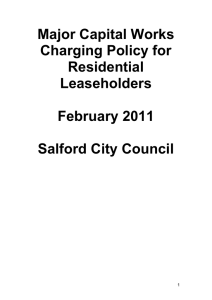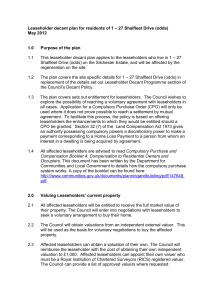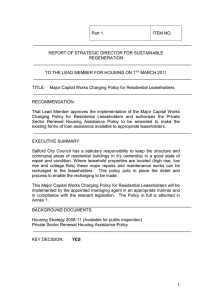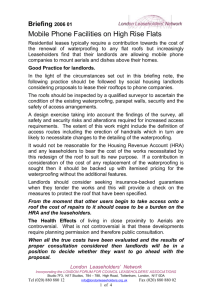Part 1 ITEM NO. __________________________________________________________________
advertisement
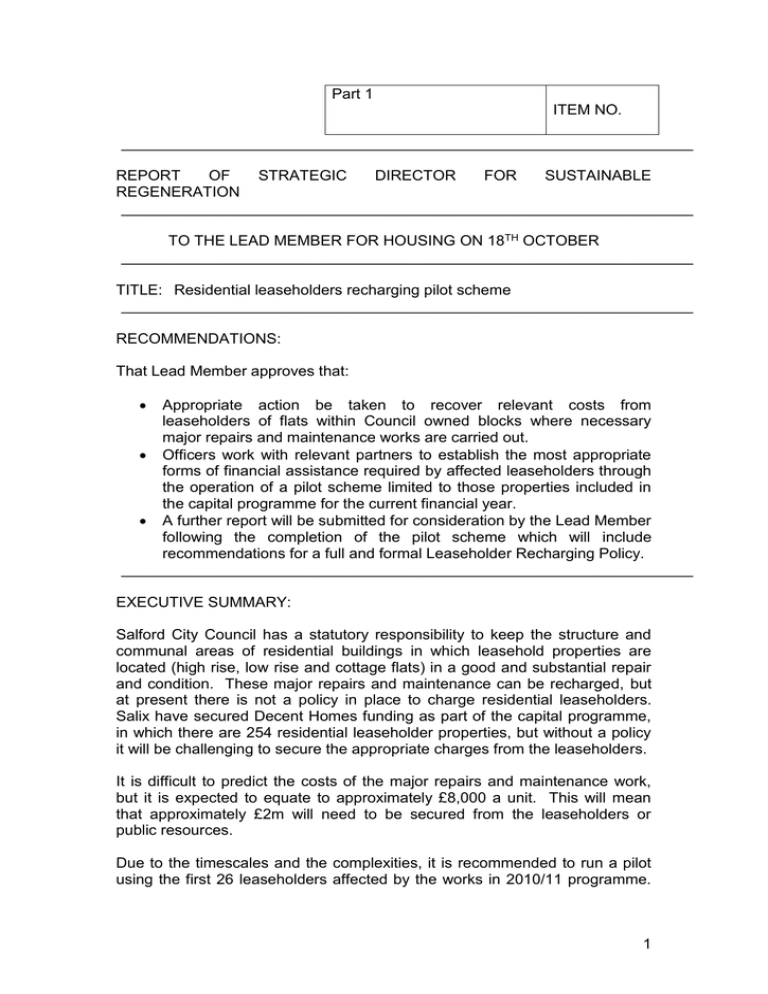
Part 1 ITEM NO. __________________________________________________________________ REPORT OF STRATEGIC DIRECTOR FOR SUSTAINABLE REGENERATION __________________________________________________________________ TO THE LEAD MEMBER FOR HOUSING ON 18TH OCTOBER __________________________________________________________________ TITLE: Residential leaseholders recharging pilot scheme __________________________________________________________________ RECOMMENDATIONS: That Lead Member approves that: Appropriate action be taken to recover relevant costs from leaseholders of flats within Council owned blocks where necessary major repairs and maintenance works are carried out. Officers work with relevant partners to establish the most appropriate forms of financial assistance required by affected leaseholders through the operation of a pilot scheme limited to those properties included in the capital programme for the current financial year. A further report will be submitted for consideration by the Lead Member following the completion of the pilot scheme which will include recommendations for a full and formal Leaseholder Recharging Policy. __________________________________________________________________ EXECUTIVE SUMMARY: Salford City Council has a statutory responsibility to keep the structure and communal areas of residential buildings in which leasehold properties are located (high rise, low rise and cottage flats) in a good and substantial repair and condition. These major repairs and maintenance can be recharged, but at present there is not a policy in place to charge residential leaseholders. Salix have secured Decent Homes funding as part of the capital programme, in which there are 254 residential leaseholder properties, but without a policy it will be challenging to secure the appropriate charges from the leaseholders. It is difficult to predict the costs of the major repairs and maintenance work, but it is expected to equate to approximately £8,000 a unit. This will mean that approximately £2m will need to be secured from the leaseholders or public resources. Due to the timescales and the complexities, it is recommended to run a pilot using the first 26 leaseholders affected by the works in 2010/11 programme. 1 The pilot will then help inform the development of a robust Residential Leaseholder Charging Policy. __________________________________________________________________ BACKGROUND DOCUMENTS: Housing Strategy 2008-11 (Available for public inspection) Community Impact Assessment Salix Homes Consulting Leaseholders and Section 20 __________________________________________________________________ KEY DECISION: DETAILS: YES 1.1 Salix Homes is seeking to deliver the Decent Homes programme on the housing stock that it manages on behalf of the Council in Central Salford. Many of the homes reside in apartment blocks which will require collective programmed major repairs and maintenance. Importantly, 254 units in the Council owned apartment blocks have been purchased through Right to Buy are now owned by leaseholders. 1.2 This will mean that as a minimum major repairs and maintenance work for all units will need to be undertaken, irrespective of ownership of an apartment. This is because Salford City Council has a statutory responsibility to keep the structure and communal areas of residential buildings in which leasehold properties are located (high rise, low rise and cottage flats) in a good and substantial repair and condition. 1.3 Salix Homes, as the managing agent has responsibility for delivering the works required to maintain the properties. Legislation and the terms of the lease allows the City Council to re-charge leaseholders for a proportion of any maintenance and repair works that are carried out as part of this duty. This charge for leaseholders excludes improvement works such as “Decent Homes.” 1.4 Legislation also places a statutory duty on the City Council to make loans available to qualifying leaseholders to assist them in meeting these major repairs and maintenance costs. However, the Council has discretion regarding the nature of such loans and the imposition of conditions attached to them, for example the length of the repayment period. 1.5 There are 254 residential leaseholder properties, that will be affected by the major repairs and maintenance works. It is difficult to predict the costs of the major repairs and maintenance work, but it is expected to equate to approximately £8,000 a unit. This will mean that approximately £2m will need to be secured from the leaseholders or public resources. 2 1.6 Due to the timescales and the complexities, it is recommended to run a pilot using the first 26 leaseholders affected by the works in 2010/11 programme. The pilot will then help inform the development of a robust Residential Leaseholder Charging Policy that will need to consider existing housing and Financial Services Authority guidelines and legislation including: mandatory consultation, capital funding to finance the works, compliant financial products and approaches for leaseholders including Statutory Loans; and revenue funding to set up and administer the recharging of the costs 1.7 Working with Salix Homes, the leaseholders, Leaseholders Forum and Salford Money Line and others the City Council will seek to understand and address these issues with a view for developing a robust residential recharging Policy to support the 2011/12 programme. __________________________________________________________________ KEY COUNCIL POLICIES: Housing Strategy 2008-11 __________________________________________________________________ EQUALITY IMPACT ASSESSMENT AND IMPLICATIONS:A Community Impact Assessment was completed and concluded that there would not be an adverse impact. __________________________________________________________________ ASSESSMENT OF RISK: Low Without the identification and testing of issues in the pilot, the development of a robust policy would be impeded. It is important to identify these issues, as there are 254 residential leaseholders affected by the Decent Homes programme, which equates to approximately £2m that will need to be financed from either public finances or privately by the leaseholders. Although there is a significant potential cost of £2m to public finances this robust approach of working with partners with existing proven working relationships allows an anticipated successful pilot and the development of a robust policy. As such at present the risk is deemed as low. __________________________________________________________________ SOURCE OF FUNDING: Leaseholders, unless qualifying for assistance are responsible for paying for major repairs and maintenance and will need to seek appropriate private financing. Funding for those who qualify will come from the Housing Capital Programme 2010-11, but Salford City Council will seek to secure repayment 3 from these qualifying residential leaseholder over a period of time. The solutions for recharging will be addressed within the Residential Leaseholder Policy. __________________________________________________________________ LEGAL IMPLICATIONS: Supplied by Norman Perry (Ext: 2325) When a Council flat is sold under the Right to Buy legislation, the purchaser becomes liable for the internal repair of the flat and also for contributions to the maintenance of the structure. Legal advice should have been supplied to the Buyer by his solicitor, so the liability for these costs should come as no surprise. The purpose of the exercise is to discover the best way of offering finance (as we are statutorily obliged to do) in ways in which to allow clawback of the loans. FINANCIAL IMPLICATIONS Supplied by Peter Butterworth (Ext: 8791) Provision will need to be made in the Sustainable Regeneration (Public Sector Housing Programme) Capital budget for the full cost of the works in line with the statutory responsibility to maintain the structure of the buildings involved. The pilot exercise will enable details of how the income from leaseholders can be recovered and will enable a capital income budget to be drawn up. __________________________________________________________________ OTHER DIRECTORATES CONSULTED: None, not relevant __________________________________________________________________ CONTACT OFFICER: TEL. NO. Mark Hart 0161 793 2039 __________________________________________________________________ WARD(S) TO WHICH REPORT RELATE(S): Broughton, Kersal, Irwell Riverside, Langworthy, Ordsall, Weaste and Seedley, Claremont, 4 Swinton South, Claremont. 5 Annex: Major Repairs and Maintenance Works for Residential Leaseholders Briefing Summary: This briefing provides the context to major repairs and maintenance work for residential leaseholder properties, the issues and implication this raises, options, conclusion and a recommendation for the way forward. Background: Salix Homes secured Decent Homes programme funding and is seeking to deliver this programme on the housing stock that it manages on behalf of the Council in Central Salford. Many of the homes reside in apartment blocks which will require collective programmed major repairs and maintenance. Importantly, 254 units in the Council owned apartment blocks have been purchased through Right to Buy are now owned by leaseholders. This will mean that as a minimum the Decent Homes funding will pay for major repairs and maintenance work for all units, irrespective of ownership of an apartment. This is because Salford City Council has a statutory responsibility to keep the structure and communal areas of residential buildings in which leasehold properties are located (high rise, low rise and cottage flats) in a good and substantial repair and condition. However, only Council units will then have improvement works undertaken to bring the units up to Decent Homes Standard. Salix Homes, as the managing agent has responsibility for delivering the works required to maintain the properties, and under the terms of the lease Salix Homes re-charge leaseholders on behalf of the Salford City Council for their share of any maintenance and repair works that are carried out as part of this duty. This charge excludes improvement works such as “Decent Homes” which leaseholders may choose to opt into through privately financed means. Issues and Implications: Leaseholder mandatory consultation Leaseholders cannot refuse permission for the works to go ahead, because Salix Homes has responsibility to repair and maintain the building under the terms of the lease agreement. However, leaseholders have a legal right to be consulted prior to the commencement of major repairs and maintenance work under Section 20 of the Landlord and Tenant Act 1985 (amended by Section 151 of the Commonhold and Leasehold Reform Act 2002). This prescribed consultation will detail the work, why it is needed, contractor arrangements and options, timescales and the charges. Leaseholders do have the right to challenge the charges and the reasonableness of the work via the Leasehold Valuation Tribunal. If leaseholders are not consulted in line with the legislation and Salix Homes’s “Consulting leaseholders and Section 20” 6 policy, then the maximum a leaseholder can be charged is £250 for the work. This will mean that the difference between the actual cost and £250 will be borne by the public sector. Major Repairs and Maintenance Works Policy for Residential Leaseholders Currently, there is not a Policy in place to charge residential leaseholders for major repairs and maintenance works. The Council still retains ownership of the stock and so it is the responsibility of the City Council to develop a policy, which will then be administered by Salix Homes. Without this it will be challenging to secure the appropriate charges from 254 leaseholders. It is difficult to predict the costs of the major repairs and maintenance work, but it is expected to equate to approximately £8,000 a unit. This will mean that approximately £2m will need to be secured from the leaseholders or public resources. Statutory Loans: In some cases, the Council has a legal obligation to provide a Statutory Service Charge Loan, as per the Housing (Service Charge Loans) Regulations 1992. To qualify a leaseholder must meet a number of criteria. Based upon the information provided by Salix Homes about the 254 leaseholders, it is anticipated that up to 173 leaseholders will potentially meet this criteria. Assuming the above estimated cost per unit, this equates to £1.4m – this will need to be identified from public resources. Payment options and securing repayment: A policy will help address this issue, but the type of repayment options Salford City Council wishes to offer, who will assess and identify the leaseholders ability to pay and options, who will administer the repayment process and other issues all need to be considered. There will be resource implications, but there is a need to consider Financial Services Authority requirements as well. Timescales: Between October 2010 and February 2011 there will be 26 leaseholders that will be affected by the works. If appropriate consultation can’t be undertaken with the leaseholders then they will only be charged a maximum of £250 each (£6,500 in total), against an estimated repairs and maintenance cost of £8,000, (£208,000 in total) that will need to be borne out of public finances. The remaining leaseholder properties will be affected over the coming years of the programme. Options: Option 1. Do nothing 7 This would mean that the public purse is subject to providing a short fall of approximately £1,940,000 (254 * £8,000 – 254 * £250). Option 2. Run a pilot Due to the timescales and the complexities, run a pilot using the first 26 leaseholders affected by the works to help inform the development of a robust policy. Conclusion: Bearing in mind the timescales, the financial implications and the current financial climate, it would be extremely difficult to justify Option 1. Option 2 allows a process to test and identify the most appropriate approach for Salford City Council, its leaseholders and that considers Financial Services Authority rules. Recommendation: This briefing seeks the noting of the issues above, discussion and agreement upon a way forward, with a recommendation for Option 2. Contact Officer: Mark Hart, Strategy and Enabling, ext: 2039 8
